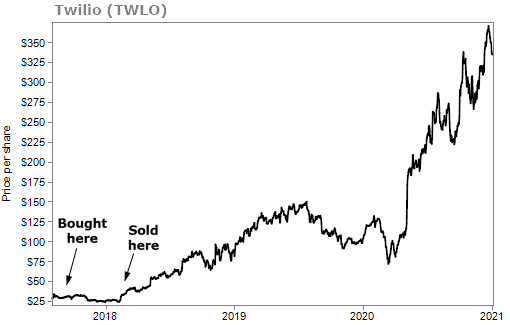I (Jeff Havenstein) still remember the first stock I ever bought...
I was 22 years old, fresh out of college, and I plopped a few hundred bucks into a brokerage account. I was eager to buy my first stock, but also nervous.
I had heard about all the money you could make in the stock market... and the investing horror stories following the financial crisis.
When it came time to choose a stock to buy, I did what a lot of novice investors do: I went to Google and searched "tech stock that will double." (Chances are, if you're reading this right now, you're probably guilty of this, too.)
That led me to a company called Himax Technologies (HIMX). If you've never heard of Himax Technologies, you're not alone. Today, the Taiwanese semiconductor company has a market cap just over $1 billion. At the time, I barely knew anything about the company. But I was caught up in the promises of 100% gains in just few months.
"Easy gains," I thought. "Sign me up."
You won't be surprised to hear it didn't double. I sold it a little while later for a not-exactly-life-changing profit of $11 (after fees). If I still held HIMX, I'd be sitting on a loss.
Lesson learned.
From then on, I told myself that I would only buy companies that I knew and could understand. This is something that every investor should do. And it's something that Doc Eifrig preaches all the time.
When you start venturing out into stocks and you can't describe how the company operates or how it makes money to a friend, the stock is probably not for you.
Buying a Taiwanese semiconductor company was my first big investing mistake. I've made others, too...
I made the mistakes of not diversifying properly and not using proper position sizing. And like ALL investors – I've made the mistake of selling great stocks too early.
Everybody has missteps early in their investing careers. It's an expensive tuition, but it's how we all learn.
Selling too early isn't limited to novice investors though... Even the most experienced investors do this all the time. We're all human after all.
And we do this because of something called "loss aversion."
Loss aversion is the idea that losses have a larger psychological impact than gains of the same size.
You see, once a stock has gone up in value, human nature compels us to "lock in" our gains. We think that one of two things can happen after a stock goes on a solid run... Either the stock continues to march higher and your profits will continue to grow. Or the stock could start to head lower and you'll lose those gains – possibly even turning your winning position into a loss.
The mind's desire to avoid the possibility of a future loss leads many people to sell great stocks too early – even if they are still bullish on the stock.
This is painful for me to bring up, but I have my own example of selling too early. I'm still gritting my teeth about selling cloud-communications company Twilio (TWLO) too soon.
I can't remember exactly why I sold, but I know it wasn't because my outlook for the company changed. If I simply held on, I'd be up 1,000% today.

Maybe your big regret was selling a stock like Amazon (AMZN) or Apple (AAPL) too early. Like I said, even the most experienced investors can make this mistake.
Selling too early – or selling a loser too late – is much more common than you think.
You have to be disciplined if you want to avoid doing this. Remind yourself each day why you bought the stock in the first place. If the story still makes sense, you should continue to hold. But if the story changes for the worse, it's time to sell.
You could be the greatest stock picker in the world, but your returns will suffer if you consistently choose the wrong time to sell.
And after stocks have had a historic rally over the past few months – climbing 65% from their March lows – you may be wondering when the time is to sell. After all, stocks are expensive. They trade for 29 times earnings when they have historically traded around 20 times earnings.
To help you decide when to sell, my colleague Steve Sjuggerud recently went on camera to discuss his outlook for the market. He even talked about the exact moment when you should sell your stocks.
If you have any money invested in the stock market, watch this video today.
What We're Reading...
- World Bank sees global output up 4% in 2021, flags downside risks.
- Something different: Boston University's basketball teams wear masks during season-opening games.
Here's to our health, wealth, and a great retirement,
Jeff Havenstein and Dr. David Eifrig
January 6, 2021
